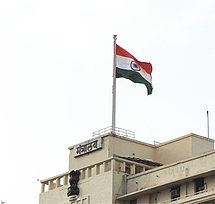



On 3 June 1947, Viscount Lord Louis Mountbatten, the last British Governor-General of India, announced the partitioning of the British Indian Empire into India and Pakistan, under the provisions of the Indian Independence Act 1947. At the stroke of midnight, on 15 August 1947, India became an independent nation. This was preceded by Pandit Jawaharlal Nehru's famous speech titled Tryst with destiny.
| " | At the stroke of the midnight hour, when the world sleeps, India will awake to life and freedom. A moment comes, which comes but rarely in history, when we step out from the old to the new, when an age ends, and when the soul of a nation, long suppressed, finds utterance..... We end today a period of ill fortune, and India discovers herself again. | " |
Prime Minister Nehru and Deputy Prime Minister Sardar Vallabhbhai Patel invited Lord Mountbatten to continue as Governor General of India. He was replaced in June 1948 by Chakravarti Rajagopalachari. Patel took on the responsibility of unifying 565 princely states, steering efforts by his "iron fist in a velvet glove" policies, exemplified by the use of military force to integrate Junagadh, Jammu and Kashmir, and Hyderabad state into India. J&K became a part of India when Pakistan laid siege and the then king Maharaja Hari Singh signed the Instrument of Accession with India to save J&K from Pakistan. India responded on behalf of J&K by sending in its armed forces to counteract the Pakistani attack. Later PM Nehru went to UN and a cease fire was declared. Pakistan has not withdrawn its military forces from the occupied Kashmir, and the territory termed as POK (Pakistan Occupied Kashmir) has ever since been a cause of contention between India and Pakistan.

